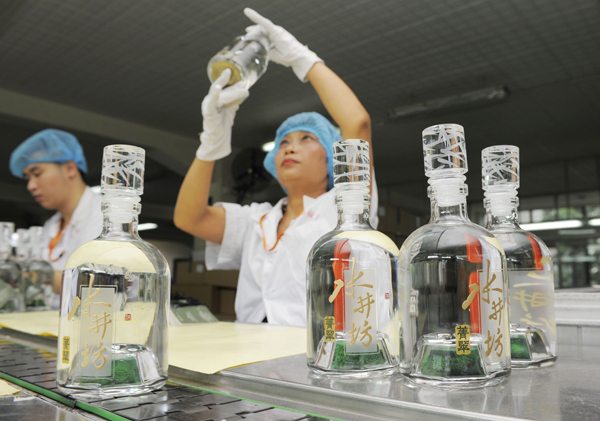
2017 was a boom year for the liquor market in China, with Chengdu, Sichuan-based baijiu distiller Shuijingfang Liquor Industry Co Ltd among the prominent gainers.
Prices of high-end baijiu varieties rose in 2017 in line with the ongoing consumption upgrade in China. Shuijingfang plans to promote its premium products to meet the demand for pricy, high-quality rice wine.
Shuijingfang recently launched a new high-end variety of baijiu, the Chinese white liquor, called Forest Green. It requires over 10 years of storage first before it matures and develops into a fragrant, thick and pure-body liquor with a touch of crispy, refreshing taste of bamboo.
Forest Green was served at the 2017 Fortune Global Forum in Guangzhou.
Fan Xiangfu, general manager of Shuijingfang, said, "We've gone through a lot of experiments and tests before discovering the right formula for Forest Green. It's a product of 10 years of efforts."
According to a report by Shuijingfang and iResearch, a Beijing-based consultancy, 97 percent of high-income consumers have high regard for traditional Chinese culture, and 96 percent of them think promoting its essence will help boost confidence in local culture.
The report said such consumers look for not only foreign luxury brands but domestic brands with cultural significance. Shuijingfang fits in with this narrative.
This is also attracting top-end talent to Chinese premium liquor companies. Fan joined the baijiu industry after gaining over two decades of experience in Denmark's Carlsberg. A Chelsea football club supporter, Fan brings his insights from selling beer for a foreign company to the domestic distillery.
"Over 20 years of my career life was in the beer industry. Joining Shuijingfang was a choice that seems very natural to me," he said. "Selling baijiu and beer has something in common, and I appreciate the management philosophy in foreign companies that emphasizes heavily on results. I hope I can bring useful experience to Shuijingfang."
He is not much of a baijiu drinker himself. "It's very challenging to persuade young consumers to buy baijiu," he said. That's because compared to beer, baijiu has high alcohol content. And good baijiu is much more expensive than beer.
Young consumers may not buy cheaper baijiu. For, drinking baijiu is kind of a social activity, and consuming cheaper varieties could lead to a loss of face.
Fan said the key to higher sales therefore is in finding a powerful drive to make the young consumers buy baijiu-either make it a social habit or make it fashionable.
"Like in South Korea, cheap baijiu is both affordable and regarded as common," he said.
Fan thinks Shuijingfang's future lies in the high-end liquor market. "Last March, we started to sell Shuijingfang Classic priced 979 yuan ($148). In November, we launched Forest Green with a price tag of 1,699 yuan. We are eyeing an influential position in the high-end baijiu market.
"The future of the baijiu industry will be full of challenges and any brand that wants to stand firm in the high-end market will need constant investment, to expand the category and communicate more with consumers."
According to Fan, Shuijingfang's market share is 4 percent in the middle and high-end segments, which means there is immense scope to grow.
"Baijiu is the fastest-growing category in the Chinese liquor industry," he said. "In 2016, baijiu sales accounted for 76 percent of totally liquor sales, among which high-end baijiu made the biggest gain, up almost 16 percent year-on-year."
Led by Fan, Shuijingfang will also seek to conquer overseas markets. Around 5.5 billion liters (1.45 billion gallons) of baijiu was consumed throughout the world in 2016, according to London-based consultancy Euromonitor International.
"Shuijingfang has always been performing well in the global market, and the company has developed different products to tickle international tastebuds," said Fan. "We've even invited established Sichuan cooks to customize a full course to pair with baijiu. This has been appreciated by Korean salespersons and restaurant owners."
To further expand its presence in overseas bars and pubs, Shuijingfang has hosted two cocktail contests in select cities and towns in the United Kingdom and the United States over the past two years.
"Baijiu makers de-stocked inventory and tweaked strategies to suit the changing consumer market, such as by going more premium," said He Yong, deputy secretary-general of the China Alcoholic Drinks Association, which is based in Beijing.
